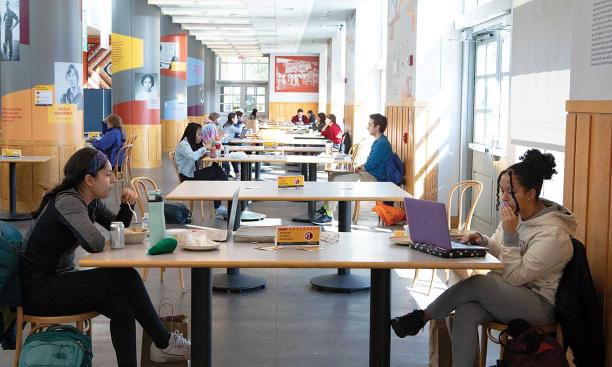
Robin Izzo vividly recalls the start of the pandemic. As the leader of the campus COVID-19 response in her role as executive director of environmental health and safety, she took part in early 2020 meetings with other officials to discuss ways to mitigate the spread of the virus without disrupting campus life. As they learned more about COVID, she was convinced “there’s no way that we can do this,” she said. A few weeks later, the University announced that students would leave campus for the remainder of the semester.
In the two years since, students, faculty, and staff have navigated virtual learning, working remotely, and in some cases, losing loved ones. Izzo said that with vaccines now widely available, the campus community is “in a better place,” and has adjusted to the new normal of living with the virus.
As we enter year three of COVID at Princeton, PAW asked members of the campus community to reflect on the lessons they learned during the pandemic.
Like Izzo, Dean of the College Jill Dolan participated in early discussions about how the University would respond to the threat of COVID. Dolan said during a recent Zoom interview that she’s learned a lot about science, the virus, and public-health guidance — not exactly her areas of expertise (“I have a Ph.D. in performance studies,” she said with a chuckle).
One of the biggest lessons for Dolan was the importance of addressing the situation with humanity, recognizing the emotional and physical toll COVID has taken. Offering a P/D/F grading option and encouraging faculty to grade with compassion, she said, were among the actions intended to help alleviate the stress and anxiety of students.
“I like to think that that’s my commitment as a University administrator to also be a human being first, but at a moment when our lives were under such threat and people’s emotions were so rightfully high, it’s been really important to hold on to that value,” Dolan said.
Kate Stanton, director of the McGraw Center for Teaching and Learning, has given a lot of thought to sustaining the educational environment during this period. It took creativity to adapt all types of Princeton classes, from traditional lectures to dance courses, for remote learning, she said. Professors offered live and prerecorded classes, invited more guests to class via Zoom, and sent lab kits so students could conduct experiments at home, among other solutions.
Stanton hopes that some of the positive aspects of virtual learning will remain. “I do hope this experience will encourage us to allow for even more flexibility in our classrooms,” she said. One idea is to equip classrooms with technology to have visitors on Zoom. She also pointed to the example of a professor whose classes greatly benefited from breakout rooms on Zoom — and asked how to recreate that in person. Incorporating small, interactive group work may require thinking differently about architecture, furniture, layout, and more, Stanton added. “Harder to do if chairs are bolted to the floor, right?” she said.
For many professors, virtual learning does not compare to in-person classes. Michael Graziano ’89 *96 found it challenging to gauge how much his students were absorbing in his introductory neuroscience class. He missed having exchanges that come naturally in person, such as seeing students’ faces and body language, which served as feedback on his teaching. “I was very happy to come back to a real classroom and actually see real people again,” he said.
For students, the pandemic has illuminated the value of connection. At the start of the pandemic, Kanishkh Kanodia ’23 resumed his studies from his home in India. Virtual learning and staying connected with friends were difficult because of the time-zone differences. He’s been grateful to return to campus. The pandemic has shifted his perspective on what makes for a positive college experience. He used to think it was only about working hard toward his career goals.
“I realized that college life is not just supposed to be just about grades,” Kanodia said. “It’s supposed to be about finding people who motivate you, finding people with different perspectives, and finding people you can discuss and talk about anything with and grow together.” As a residential college adviser for First College, he hopes to instill this value in his advisees as well.
Ashwin Mahadevan ’22 shared similar feelings. As the former vice president of the Undergraduate Student Government, he had a hand in working with University officials to navigate the myriad policy issues that impacted students, including advocating for student emergency funds and negotiating guidelines that allowed for some semblance of a social life within the evolving rules for masking, testing, and social distancing.
That last point stands out the most, he said. It didn’t dawn on him how much he missed the simplicity of gathering until the first time he sang with the full chamber choir for a fall 2021 concert. “I feel like there’s a sense among my peers and I that we want to take advantage of every single one of those opportunities,” he said.
